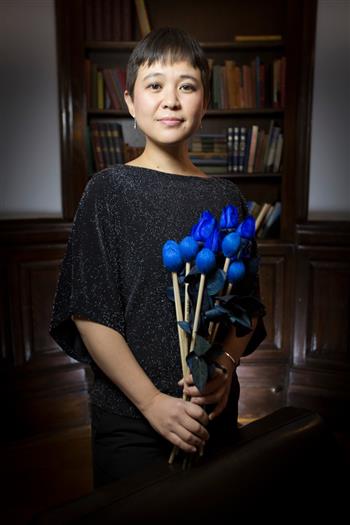by Jarrett Hoffman

•Today: Shaker Heights High School Choirs at Trinity Cathedral, organist Robert Myers at Trinity Lutheran, Apollo’s Fire in Akron, and percussionist She-e Wu joined by the CIM Percussion Ensemble
•Announcements: full-time guitar teacher opening with the Guitar Society, and Western Reserve Chorale invites vocalists to join for the remainder of the season
•Interesting reads: a bill aimed at increasing streaming royalties for musicians
•Almanac: J.S. Bach turns 339
HAPPENING TODAY:
At noon, hear the Shaker Heights High School Choirs under the direction of Nicholas LaPete in a Trinity Brownbag Concert, where they will be joined by Trinity Cathedral music director Shiloh Roby, organ. The free program includes works by Antonio Vivaldi, Moses Hogan, and Bob Chilcott. Click here for the live stream.
At 2:15 at Trinity Lutheran Church, organist Robert Myers will play a program titled “Holy Week” featuring music by Brahms, Held, Krebs, and Walcha. A freewill offering will be taken up.
At 7:30 at St. Bernard Catholic Church in Akron, Apollo’s Fire presents “¡Hispania! A Voyage from Spain to the Americas,” a program of music from 16th-century Spain to baroque Latin America featuring Sophia Burgos, soprano, and Jeremías García, flamenco guitarist and singer. A pre-concert conversation with García will take place one hour before the performance. Tickets are available online. Read a preview article here.
And at 7:30, percussionist She-e Wu will be joined by the CIM Percussion Ensemble for a free performance at Mixon Hall on the CIM Insiders series. The program includes works by Bach, Perdue, and Ferchen. Click here to view the program and for a required seating pass.
ANNOUNCEMENTS:
The Cleveland Classical Guitar Society has an open position for a full-time guitar teacher. Find out more here.
Western Reserve Chorale invites vocalists to join for the remainder of the season. More info here.
INTERESTING READS:
The “Living Wage for Musicians Act” was introduced by Congressional representatives Rashida Tlaib and Jamaal Bowman earlier this month with the goal of increasing streaming royalties for musicians. Read more here in an article by Zoe G. Phillips for The Hollywood Reporter.
TODAY’S ALMANAC:
by Daniel Hathaway
Overshadowing the birth of Russian pianist Sviatoslav Richter on this date in 1915, and the 1948 duel on that date between CBS and NBC to broadcast the first symphony orchestra concert (CBS won by 90 minutes with a Philadelphia Orchestra program, and NBC was the runner up with a Toscanini-led NBC Symphony performance), German composer Johann Sebastian Bach was born in Eisenach in 1685.
Bach’s output was so extensive that there’s no paucity of music to recommend to mark his birthday. But because he was occasionally called upon to create birthday or name-day cantatas for his employers, let’s spin his cantata Was mir behagt, ist nur die muntre Jagd, BWV 208, written for the 31st birthday of the Duke of Saxe-Weissenfels in February, 1713. Here’s a complete performance led by Helmuth Rilling.
It’s fun to run down a list of available arrangements of the most famous movement in BWV 208, “Schafe können sicher weiden,” or “Sheep may safely graze.” The original, sung by the character of Pales, is a charmingly simple thing scored for soprano and continuo with two obligato recorders that casts the Duke as the faithful shepherd who protects his flock.
Although Sheep is most frequently performed by such pianists as Leon Fleischer, Lang Lang and Gina Alice, and Murray Perahia, you can also find the aria in versions sung by Kirsten Flagstad, played by classical guitarist Christopher Parkening, or the Canadian Brass, or in a full orchestral elaboration by Leopold Stokowski. What would Bach have thought? Had he lived in the 21st century, would he have earned royalties?
Bach’s Birthday nearly coincides with the Vernal Equinox, and a very pleasant way to celebrate that conjunction involves another cantata, Weichet nur, betrübte Schatten (“Vanish now, troubled shadows”), that Bach wrote for a wedding, perhaps his own, and probably in Weimar around 1714. Apollo’s Fire has recorded BWV 205 with soprano Amanda Forsythe and oboist Debra Nagy — click here to listen to the gorgeous opening Sinfonia, and here to watch a video of the complete work as performed on the music series at Christ & St. Luke’s Church in Norfolk, VIrginia, led by Kevin Kwan, a graduate of the Cleveland Institute of Music.


